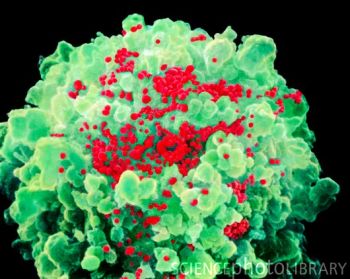加州理工学院生物学教授、诺奖获得者大卫•巴尔的摩(David Baltimore)领导的研究团队近日发表了一篇文章,解释为什么HIV感染不能被根除。

David Baltimore及其同事结合HIV感染和药物治疗的数学模拟及细胞培养模型发现,艾滋病病毒会利用已感染细胞来接近健康细胞,从而实现病毒大批量传播,这可能是艾滋病病毒在经过抗逆转录病毒药物成功治疗后,仍能在少数受感染细胞中存活的原因。这篇文章刊登在8月17日的《自然》杂志上。
这是一种新的解释。实际上,为何无论是现行的药物,还是自身的免疫,或是疫苗,仍还没有一种有效的方法可以根除体内的艾滋病病毒?
生物探索推荐英文论文摘要:
Latency and ongoing replication have both been proposed to explain the drug-insensitive human immunodeficiency virus (HIV) reservoir maintained during antiretroviral therapy. Here we explore a novel mechanism for ongoing HIV replication in the face of antiretroviral drugs. We propose a model whereby multiple infections per cell lead to reduced sensitivity to drugs without requiring drug-resistant mutations, and experimentally validate the model using multiple infections per cell by cell-free HIV in the presence of the drug tenofovir. We then examine the drug sensitivity of cell-to-cell spread of HIVa mode of HIV transmission that can lead to multiple infection events per target cell. Infections originating from cell-free virus decrease strongly in the presence of antiretrovirals tenofovir and efavirenz whereas infections involving cell-to-cell spread are markedly less sensitive to the drugs. The reduction in sensitivity is sufficient to keep multiple rounds of infection from terminating in the presence of drugs. We examine replication from cell-to-cell spread in the presence of clinical drug concentrations using a stochastic infection model and find that replication is intermittent, without substantial accumulation of mutations. If cell-to-cell spread has the same properties in vivo, it may have adverse consequences for the immune systemlead to therapy failure in individuals with risk factorsand potentially contribute to viral persistence and hence be a barrier to curing HIV infection.
生物探索相关推荐:







